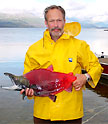Courses
Aquatic Ecological Research in Alaska
The goals of the course are to provide a small number of students with direct, hands-on training in the theories and techniques of research in aquatic ecology. We use the well-equipped field camps and diverse aquatic environments to give students formal course material (i.e., lectures and instruction manuals) and practical experience in the planning, design, and completion of research projects.
FISH 312 Fisheries Ecology
Ecological characteristics of fishes and shellfishes in the important freshwater and marine habitats of North America. Relationship between physical aspects of the habitats and community structure. Impacts of human activities on diversity and abundance. Recommended: FISH 210; FISH 311. Offered: Sp.
FISH 450 Salmonid Behavior and Life History
Marine distribution, homing migration, and spawning behavior of adult salmon: incubation, emergence, migration, and residence of fry; fingerling distribution and residence with reference to species interaction and population evolution. Recommended: FISH 311. Offered: A.
FISH 297 Introduction to Scientific Communication
This class is designed to teach undergraduate students in the School of Aquatic and Fishery Sciences and other areas of biology to 1) gather published and unpublished sources of written information and bring them to bear on scientific questions, 2) critically read scientific writing, 3) access electronic sources of information, including but not limited to internet searches, library databases, and public information and data, 4) learn the structure and functions of different components of scientific papers to effectively communicate scientific findings, 5) learn techniques for effective communication of scientific information in oral and poster presentations, 6) understand the ethical boundaries associated with scientific communication.
